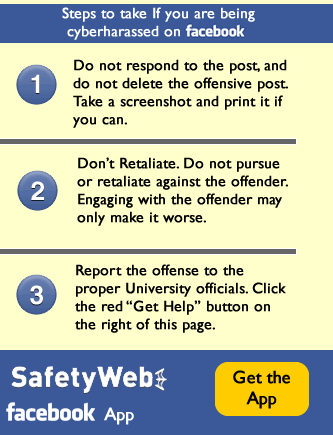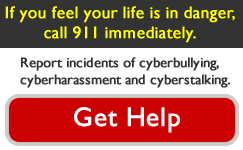What do I do if I am being harassed online through Facebook or other public social networks? 
Social networks, especially Facebook which has over 500 million active users (and counting), have unfortunately become a common means of cyberharassing individuals. If you have been victimized this way through Facebook, SafetyWeb.com provides a Facebook App with some great advice in how tohandle an attack on Facebook. Here are some steps you should follow:
- Do not respond to the post, and do not delete the offensive post. Take a screenshot and print it if you can.
- Don't retaliate. Do not pursue or retaliate against the offender. Engaging with the offender may only make it worse.
- Report the offense to the University officials listed under "Cyber Safety Help" on the right of this page.
What can Campus Technologies do to track anonymous Facebook harassment?
Unfortunately, Campus Technologies has limited resources to track exactly where an anonymousFacebook post originates from. Preserving the offensive post and capturing a screenshot is very important. It could assist in identifying theperpetrator of the action.
Facebook Privacy
Facebook allows great control in overseeing who sees your profile, pictures and other activities on your Facebook account. Most Facebook users are aware that prospective employers may sometimes view your Facebook account and other social networking profiles. The Facebook privacy options allow you to showyourFacebook datato those you're OK with seeing it, and hide it from those you don't. Regardless of your privacy settings, you should NEVER assume that anything you post to Facebook is ever truly private. In addition, there are no safeguards available to prevent someone intending to doyou harmeven if you have the user blocked and isolated.
Facebook has made great improvements in the privacy settings it allows you to choose. Below are some resources about Facebook privacy, including an excellent video guide from ConnectSafely.
Cyber Safety Resources
Facebook Cyber Safety can assist you with reporting cases of Facebook harassment and provides some useful resources to help you understand Facebook and privacy.
Stay Safe Online provides information for college students to help keep their online information and browsing safe and secure.
Doing any activity online requires everyone to Stop. Think. Connect.










